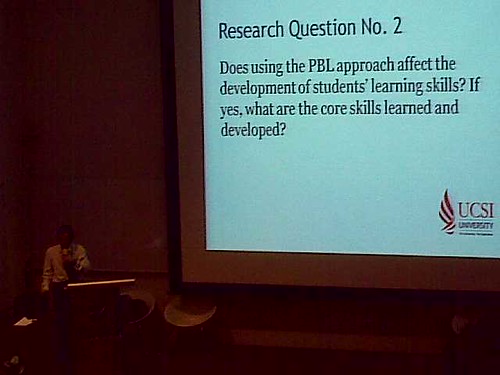Day-2, 11 Jun 09.
i) Presenter Dr. P'ng Tean Hwa (co-author Irene Tan Ai Lian). UCSI University, Malaysia. "Assessing Learning through Reflective Essays in Music Education"

Quick notes (italics are mine):
P'ng says using "teacher-centered" approach was limited. Traditional teaching approach couldn't convey all he wanted to cover and students not prepared to grasp some concepts. When PBL implemented, curriculum had to change including assessment methods.
Students asked to write reflective essays as part of Summative assessment. Sets three problems for semester. Majority are Piano-majors.
Found that with PBL his intro course students progressed beyond level 3 of Bloom's Taxonomy, i.e. L3 =Application, to Analysis and even Synthesis.
Students were initially apprehensive with PBL approach (they were more familiar with lectures and performance). Definitely unfamiliar with student-led approach.
P'ng acknowledged there were problems with PBL approach. E.g. Student skepticism and prior baggage re poor team work and peer conflict. But says he decided to pre-empt the students concerns by explaining the PBL approach.
(Seems to me success of PBL depends largely on intelligent application by educator. Attitude of educator more than tool)
My Tweets:
P'ng: found with PBL, his intro course students could progress beyond L3 of Bloom's Taxonomy. Assessed via reflective essays.
with PBL, P'ng found he's also posing deeper questions to students. Students (piano majors) forced to be more precise in thinking
prob w PBL: student skepticism & previous bad experience re teamwork and peer conflict. P'ng preempts by explaining PBL approach
BTW, I discovered this site by a hearing-impaired music student of Dr. P'ng.
ii) Loretta Ho Man Wah. The University of Hong Kong. "Maximize the Effects of Problem-based Learning through Aligning the Curriculum with On-going and Multidimensional Assessment"

[Various types of assessment tools HKU used in their PBL approach. Which is still an on-going research as of the presentation]
iii) Dr. Chan Kam Chi, Purdue University North Central, USA. "Learning about Teaching: A Student Teacher’s Emotions in The Journey of Growth".
A fascinating account by Dr. Chan of her trainee-teacher's emotional words expressed as reflections, submitted as part of a PBL assessment.
The gist of it: The 40+ trainee-teacher described how she fell into a depressed state from having to deal with a very challenging class. After much urging, she finally decided to hold a class meeting and confront the situation. The trainee-teacher got to a point in her script where she broke down and cried. Apparently by showing her emotions, the class responded to her and paid attention for the first time.
Dr. Chan asked if emotion could -- and should -- be assessed as part of PBL. Whether there was a need to look at another dimension of PBL assessment.

Dr. Chan's research question came from that particular case of her trainee-teacher. Initially, Dr. Chan required her trainee-teachers to submit a Reflection-journal that was quite standard in format.
But soon it became apparent that particular trainee-teacher became withdrawn. Yet the reflective journal merely recorded what was done but obviously not reflecting the trainee-teacher's emotive state. Dr. Chan asked her trainee-teacher to abandon the required format and simply express how she truly felt.
BTW the trainee teacher won an outstanding future teacher award in the end, for turning the class around.
Dr. Chan argues that assessing student-learning may require assessment of student emotions.
(Twitter hashtag #pbl09w)
[Next: Part 5]

No comments:
Post a Comment
Join the conversation. Leave a comment :)
Note: only a member of this blog may post a comment.